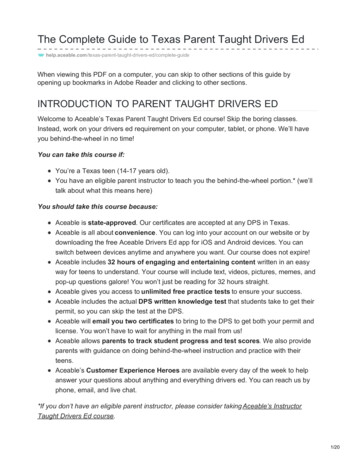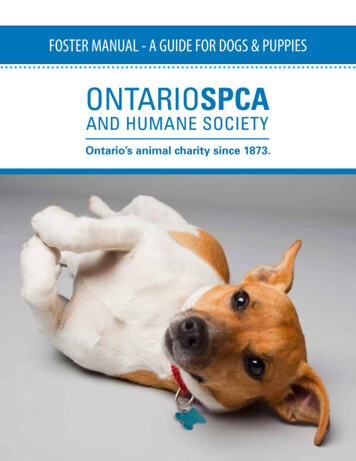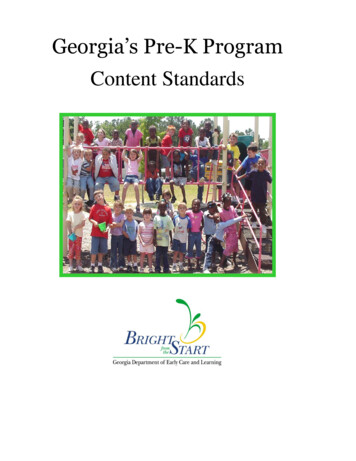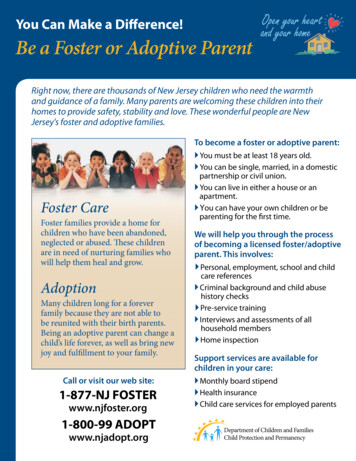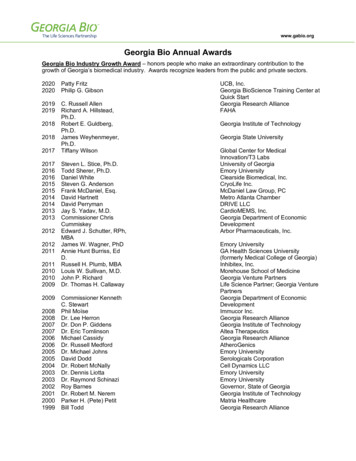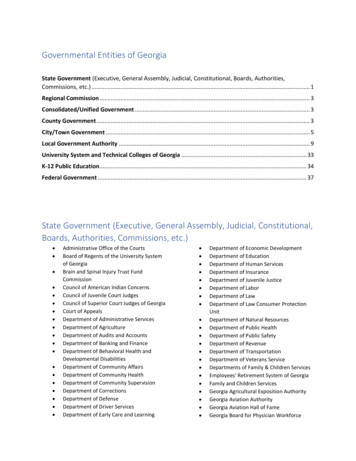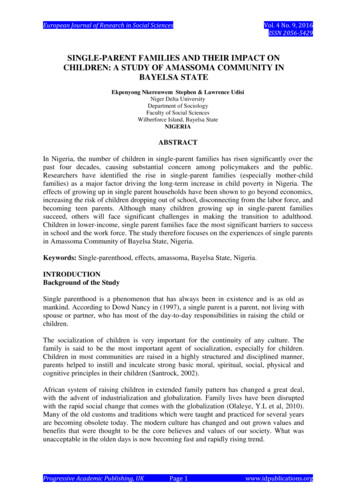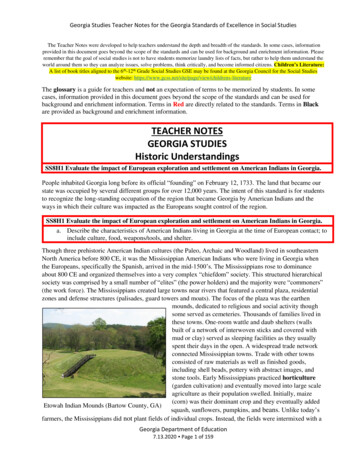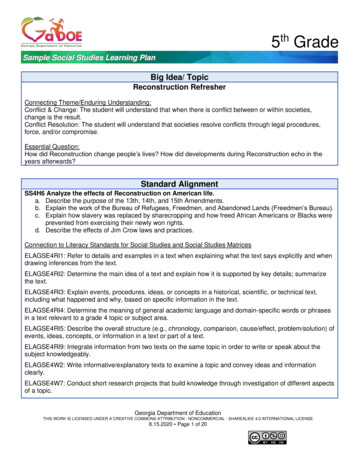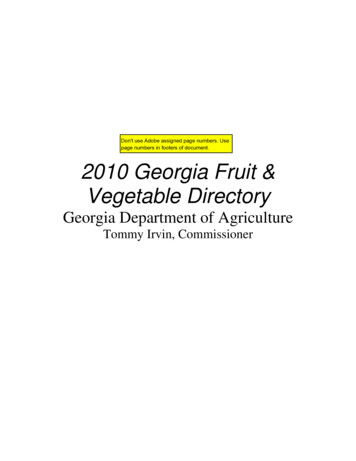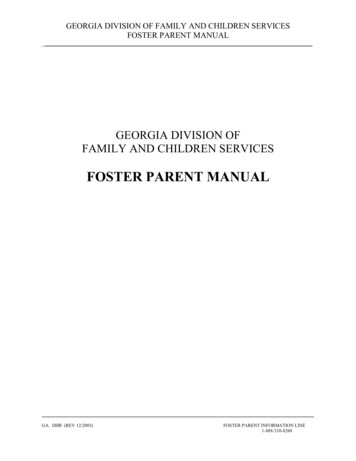
Transcription
GEORGIA DIVISION OF FAMILY AND CHILDREN SERVICESFOSTER PARENT MANUALGEORGIA DIVISION OFFAMILY AND CHILDREN SERVICESFOSTER PARENT MANUALGA. DHR (REV 12/2003)FOSTER PARENT INFORMATION LINE1-888-310-8260
DIVISION OF FAMILY AND CHILDREN SERVICES -- FOSTER PARENT MANUALTABLE OF CONTENTSTOPICPAGEIntroduction 1Mission and Goals .2Legal Bases for Foster Care 3Family Foster Homes .4-5Regular Foster Home .Relative Foster Home .Foster/Adopt Home Level of Care Services Guidelines for Positive Foster Parenting Outcomes 44456-15Knowledge, Skills and Capacities for SuccessfulFoster Parenting Ensuring Continued Quality and Safety of the Foster HomeTraining (Continued Parent Development) .Re-evaluations .The Rights of Foster Parents in the Foster Care Process Responsibilities in Successful Foster Parenting .Rights and Responsibilities of the Birth/Legal ParentsIn the Foster Care Process Rights and Responsibilities of the Agency in theFoster Care Process .Rights of the Child in the Foster Care Process 1415The Placement Process 17Pre-placement Visits The Placement of a Child in Your Home Placement of the Child from Another Foster Home How the Child Reacts to Placement 17171920Meeting the Needs of the Child in Your home .6-7789111222-43How the Child Should Address the Foster Parent 22Supervision of the Child in Care .22Visitation 23When Parents Pose a Problem 24Personal Information 24Developing the Child’s Life Book 25The Child’s Personal Property .26GA. DHR (REV. 1/2004)FOSTER CARE INFORMATION LINE404-310-8260MT 01-07
DIVISION OF FAMILY AND CHILDREN SERVICES -- FOSTER PARENT MANUALTOPICPAGEMeeting the Needs of the Child (Cont.)Clothing .Mail Gifts .Medical Care .Dental Care Specialized Services .Development .School Creating a Learning Environment in Your Home .Character Development: Recreation, Chores, Spirituality .Transportation (NET) When to Call the Case Manager .Night and Weekend Illness .Situations Requiring Prior Approval by the Agency .Requirements for Out-of-Town Trips .Youth Employment .Driving and Ownership of a Motorized Vehicle .Parenting the Mentally, Physically or MedicallyChallenged Child Parenting Children of Other Races, ReligionsAnd Nationalities The Foster Parent’s Role in Supporting PermanencyCase Planning .Supporting the Return to Birth Parents .Termination of Parental Rights .Adopting the Child in Your Home (Foster HomeConversion Requirements) .Helping the Child Transition to a Permanent Resource .2728292929303030313234343535363738Expenses and Record Keeping .50Per Diem Clothing .Child Care Expenses .Foster Parent Training Costs .Educational Costs for Children in Care Child Safety Devices Child Burial Expenses .Medical Costs Obtaining Reimbursement Table of Reimbursable Expenses .50515152525353545455Special Issues in Foster Parenting 56Discipline .5640414444454748GA. DHR (REV. 1/2004)FOSTER CARE INFORMATION LINE404-310-8260MT 01-07
DIVISION OF FAMILY AND CHILDREN SERVICES -- FOSTER PARENT MANUALTOPICPAGESpecial Issues in Foster Parenting (cont.)Special Safety IssuesMotor Vehicle Safety .Safety Helmets Firearm Safety .Water Safety Fire Safety .Environmental Safety .Animal Safety .The Use of Community Volunteers .The Death of a Child in Care Information Just for You Foster Parent Organization .Complaints from the Community Assessment of Complaints by Placement Staff Child Protective Services .DFCS Special Investigation Team .Insurance .Income Tax .The Independent Living program .Georgia’s CASA Program Grievance Procedures .Often Used Terms Continued Parent Development (In-service Training) .59626263656666707173737474767878808184859193GA. DHR (REV. 1/2004)FOSTER CARE INFORMATION LINE404-310-8260MT 01-07
GEORGIA DIVISION OF FAMILY AND CHILDREN SERVICESFOSTER PARENT MANUALINTRODUCTIONFoster (fos’t r,), v.t. 1. To promote the growth or development of; further; 2. To bring up orrear, as a child in foster care. 3. To care, feed, or nourish. Synonyms – Cherish, Encourage.This manual has been developed to provide information that will assist foster parents inproviding the highest quality of service possible to the children placed in their care. Agencystaff persons at the County Department of Family and Children Services share with youthe role of meeting the needs of the children in your home. Foster parenting can be aschallenging and demanding as it is rewarding and fulfilling. It is essential, therefore, thatthe agency assists you in developing and maintaining the skills and knowledge base neededto meet the wide range of parenting needs of children who may be placed in your care.Your knowledge, understanding, commitment and daily care are necessary for the wellbeing of children who require out-of-home care. You will experience great satisfactionwith the knowledge that you are impacting the healthy growth and development of thechildren in your care. This growth might never be possible without the commitmentdemonstrated by you and thousands of other foster parents in Georgia who share thiscommon experience with you. It is important, therefore, that we begin this team effort witha common view of our mission and goals for the children and families we serve.GA. DHR (REV 12/2003)FOSTER PARENT INFORMATION LINE1-888-310-82601
GEORGIA DIVISION OF FAMILY AND CHILDREN SERVICESFOSTER PARENT MANUALMISSIONThe mission of Georgia’s foster care program is to strengthen families, protect children fromfurther abuse and neglect, and assure that every child has a permanent family.GOALSTo achieve our mission for children and families of Georgia, we have focused our workefforts, projects, and activities toward the following strategies:Ensure Safety and Permanency-- Through Family Conferencing, the departmentattempts to draw on the strength and resources of parents and extended family, theresources of the agency, the strength of other community agencies, and individualsinvolved in the child’s life. The goal is to empower and acknowledge families, and assistthem in creating a team of supports.Ensure the Most Appropriate Placement --First Placement Best Placement providesearly and on-going assessment of the strengths and needs of children and families, caseplan development with the family and the use of least intrusive interventions will reducelengths of stay and placement disruptions.Building and Maintaining Foster Care Resources – Recruiting, preparing and trainingfoster parents, other care givers and agency child welfare workers will result in teammembers who are skilled and capable in meeting the needs of children and families.Building Community Partnerships -- In order to assist families in breaking the cycles ofabuse and neglect, the Division of Family and Children Services will serve as catalyst tobring family members, community agencies, and other stakeholders such as yourself, thefoster parent, in partnership to meet the needs of children and families.Using and Developing Resources – An array of services, including preventive and leastintrusive methods (producing the least amount of trauma for the child) will enable us toserve all children in care more cost-effectively.Measuring Progress and Outcomes – On-going program evaluation will focus upon theeffectiveness of the State's child welfare system in achieving successful outcomes forchildren and families.GA. DHR (REV 12/2003)FOSTER PARENT INFORMATION LINE1-888-310-82602
GEORGIA DIVISION OF FAMILY AND CHILDREN SERVICESFOSTER PARENT MANUALLEGAL BASESGeorgia’s foster care program is guided and supported by both State and Federallegislation. The Georgia Department of Human Resources (DHR) is designated by law asthe agency to develop and administer the State’s Foster Care Program. The departmentdevelops standards for the State’s public and private child placing agencies through theDivision of Family and Children Services and the Office of Regulatory Services.Non-public (private) agencies providing foster care services are licensed by DHR throughthe Office of Regulatory Services. Such non-public agencies include: Families First, UnitedMethodist Children’s Home, Palmetto Campus of Georgia Baptist Children’s Home,AGAPE, Extended Families, Lutheran Ministries, Child Kind and others.DHR also administers a program of foster care services through its public agencies: theDivision of Family and Children Services and the Division of Mental Health, MentalRetardation and Substance Abuse. The Division of Family and Children Servicesimplements its programs through case managers in county DFCS agencies who share withyou, the foster parent, the responsibility for the care and maintenance of the child placed inyour home.In most instances, the county departments derive the authority to place and maintainchildren in foster care through a series of orders handed down by local courts, primarilyjuvenile. These orders give the department temporary custody, or at some pointpermanent custody, by terminating parental rights. An initial order giving temporarycustody is in effect no longer than twelve months. At this time a Permanency Hearing isheld for the purpose of extending custody, if required, and finalizing the permanency planfor the child. Throughout the duration of the court order, the County DFCS agency acts aslegal custodian.The Adoption and Safe Families Act of 1997 (Public Law 1aw 105-89) has establishedstrong national goals for children in our nation’s child welfare system. These goals aresafety, permanence and well-being. You will find as you review the new Foster ParentManual, changes in our state’s foster care policy and practice that emphasize the safetyand health of children as being of paramount concern in providing services.GA. DHR (REV 12/2003)FOSTER PARENT INFORMATION LINE1-888-310-82603
GEORGIA DIVISION OF FAMILY AND CHILDREN SERVICESFOSTER PARENT MANUALFAMILY FOSTER HOMESVarious types of family foster homes and services are provided for children in out-of-homeplacement. The home into which a child is placed should be based on the identified needs ofthe child at the time of placement. In reality, however, needs-based placements in fostercare are not always possible, at least not at the time of the initial placement. Despite thisshortcoming, family foster care provides the least restrictive and most family-likeenvironment for children who are in need of out-of-home placements. The following typesof family foster home situations may be provided based on the preparation and approvalreceived by the foster parents.Regular Family Foster HomeRegular family foster homes provide temporary care for children who have a range ofparenting needs, from basic to highly skilled. Ideally, placement into a regular fosterhome is time limited, during which time the case manager provides services to the birthparents in an effort to resolve the problems that resulted in the child coming intoplacement. If the situation allows, it is sometimes recommended that foster parents sharetheir child-rearing and homemaking skills with the birth parents.Some children may require long-term foster care because they are unable to return to theirown homes and because freeing them for adoption may not be the best plan. The fosterparents, the county department and the child, if possible, must agree upon plans for longterm foster care. The birth parent is involved also, when appropriate. This is a formalizedwritten agreement.Relative Foster HomeWhen relatives provide foster care, the county department continues to have legalresponsibility for the child. Relatives must meet the same requirements as regular fosterparents to be approved as relative foster parents. This type placement, when appropriate,allows the child to maintain closer ties with the existing family and is least disruptive to thelife of the child.Foster-Adopt HomesA home that is approved for the foster care placement of a specific child for whom theestablished goal is adoption is a foster-adopt home. The county department may approve asfoster-adopt homes, previously approved adoptive homes or newly approved homes at thecompletion of GPS:MAPP. Such placement resources must demonstrate the skills requiredin carrying out the role and responsibilities of a foster-adopt resource. Foster-adopt homesmust meet the regular standards of care required for approved family foster homes andany conditions specified in that approval.GA. DHR (REV 12/2003)FOSTER PARENT INFORMATION LINE1-888-310-82604
GEORGIA DIVISION OF FAMILY AND CHILDREN SERVICESFOSTER PARENT MANUALLevel of Care (LOC) ServicesFoster Homes Providing Increased Level of Care Services - A small percentage of fosterhomes provide “specialized care” for children with increased levels of physical, mental oremotional needs who can function within a family setting. Foster parents providing thistype care sometimes receive special training in addition to the basic training provided.This prepares them to better understand, accept and manage the child’s physical,emotional/behavioral needs and challenges. Foster homes providing increased levels ofcare have greater restrictions on the number of children the foster parent can care for atany given time, including their own. Foster Homes Providing Care for the Severely Emotionally Disturbed (SED)Specially trained foster parents provide care for children who exhibit moderateto severe behavioral management problems, which may include hyperactivity,impulsiveness, defiance, sexual behavior, verbal and/or physical aggression,anxiety, depression, destructiveness, and other behaviors. Foster Homes Providing Care for the Medically Fragile -- Specially trained fosterparents provide care for children with acute medical needs. Children in thesetype placements require specialized care, and intensive supervision and support.These homes must have reasonable access to medical and other communityresources. Medical professionals may provide additional training based on themedical needs of the child.An increased per diem is provided for all children approved as needing Level of Careservices. The amount of the per diem is based on the individual care requirements of eachchild. Speak with your Case Manager if you feel you are parenting a child who hasexceptional parenting needs.GA. DHR (REV 12/2003)FOSTER PARENT INFORMATION LINE1-888-310-82605
GEORGIA DIVISION OF FAMILY AND CHILDREN SERVICESFOSTER PARENT MANUALGUIDELINES FOR POSITIVE FOSTER PARENTING OUTCOMESKnowledge, Skills and Capacities for Successful Foster ParentingFoster parents have a very special and sensitive task to perform and, by necessity, must be“special kind of people.” Foster parenting goes beyond parenting one’s own biologicalchildren. It requires the skills needed for “normal” parenting and then some. Knowledge,skills and capacities important to this role include the following: Confidence in oneself and the ability to find satisfaction in being a foster parent.(KNOW THEIR FAMILY; MAKE AN INFORMED DECISION.) Ability to consider a child’s needs first, to accept the child with warmth and love.(KNOW THE CHILDREN.) Capacity to create an atmosphere of compassion, encouragement and stability,with needed flexibility. (BUILD SELF-ESTEEM.) Ability to provide kind but firm and appropriate discipline, consistent with statepolicy. (MANAGE BEHAVIORS.) Knowledge about normal development of children and a child’s need for love,protection, encouragement and limit setting at various stages of life.(KNOW THE CHILDREN; BUILD STRENGTHS/MEET NEEDS; MANAGE BEHAVIORS.) Ability and willingness to use the supervisory help of the case manager in meetingthe child’s needs. (WORK IN PARTNERSHIP; KNOW THE CHILDREN) Ability to accept birth parents as individuals important to the child(ren) and torefrain from making negative comments about parents. (WORK IN PARTNERSHIP;BUILD SELF-ESTEEM; BUILD CONNECTIONS.) Ability to share parental authority and responsibility with birth parents and tohelp the child, at his level of functioning, understand these responsibilities. (WORKIN PARTNERSHIP; BUILD CONNECTIONS; ASSURE HEALTH AND SAFETY.) Ability to cooperate with the Case Manager in helping birth parents carry outplanned activities for the child(ren). (WORK IN PARTNERSHIP.)GA. DHR (REV 12/2003)FOSTER PARENT INFORMATION LINE1-888-310-82606
GEORGIA DIVISION OF FAMILY AND CHILDREN SERVICESFOSTER PARENT MANUAL Ability to teach the children acceptable ways of behaving and standards of goodconduct; to use judgment as to whether the behavior of a child is in keeping withhis age, problems, feelings of security in your home, and to hold to reasonableexpectations of the child. (KNOW THE CHILDREN; MANAGE BEHAVIORS; COMMUNICATEEFFECTIVELY.) Ability to support the child in sorting out who he is.(BUILD STRENGTHS/MEET NEEDS; BUILD CONNECTIONS; COMMUNICATE EFFECTIVELY.)Capacity to use day-to-day events to help the child learn new information and howto live with others. (COMMUNICATE EFFECTIVELY; BUILD STRENGTHS/MEET NEEDS.) Knowledge of community programs which may help the child.(KNOW THE CHILDREN; BUILD STRENGTHS/MEET NEEDS.) Ability to give the needed support for a child’s participation in communityactivities. (WORK IN PARTNERSHIP; BUILD STRENGTHS/MEET NEEDS.) Ability to maintain an atmosphere of optimism and enjoyment, and a sense ofhumor. (KNOW THEIR FAMILY; ASSURE HEALTH AND SAFETY.) Ability to keep confidential all information about the child(ren) and his birthfamily. (ASSURE HEALTH AND SAFETY; WORK IN PARTNERSHIP.)Ensuring the Continued Quality and Safety of the Foster HomeContinued Parent Development (Training)All foster parents -- both relatives and non-relatives -- are required to complete additionaltraining hours (parent development training) each calendar year (January 1 -- December31), beginning with the year following your initial approval. The training must relate tothe skills required in the day-to-day parenting of children in care. The minimum numberof hours currently required is 15. This number may increase due to additional state and/orfederal requirements. Additional training may also be necessary for foster parentsproviding more specialized care. A waiver of DFCS training requirements can only begranted by the County Director or someone else in the department who has beendesignated that authority. Several important points should be mentioned; Continued parent development requirements can only be waived for extenuatingcircumstances in the foster family such as serious illness or major family crisisThe waiver is for a specified period of time only.GA. DHR (REV 12/2003)FOSTER PARENT INFORMATION LINE1-888-310-82607
GEORGIA DIVISION OF FAMILY AND CHILDREN SERVICESFOSTER PARENT MANUAL Parent Development or in-service training must be completed each year as notedabove; therefore, if you have not completed the required 15 hours of training at theend of the calendar year, your home will lose full approval status. This impacts thechild’s IV-E eligibility (federal funding).If children are currently being served in the home, a waiver to maintain the home inapproved status, with specific time frames for completing training and any otherrequirements, will be necessary in order for the home to continue to receive per diempayments. Federal law provides that children must be in an approved foster home toreceive certain foster care per diem funds. When a child is not in an approved foster home,an additional financial burden is placed on the State to cover the per diem cost. Thisgreatly limits the agency’s options in maintaining homes that are not in approved status,even temporarily.The failure or refusal of a relative or non-relative foster parent to complete the annualtraining requirements will be carefully assessed by the agency. With more stringentFederal requirements now in effect, the failure to meet State training requirements willresult in the closure of the foster home.Note: For additional guidelines regarding continued parent development trainingrequirements, see Appendix K.Re-evaluationsThe approval of your foster home is usually granted for one year, but may be terminatedearlier if you or the agency find it necessary. As the end of the approval period draws near,a Case Manager who is specifically designated to reassess the status of your home willschedule a home visit with you and your family to initiate the joint re-evaluation of yourhome. A re-evaluation of your home can occur before the end of the one-year period ifthere is reasonable cause. The need to re-evaluate your home prior to the scheduled annualrenewal of approval may occur for either or a combination of the following reasons: A discipline or foster care policy violation.The relocation to a new residence.Chronic, inappropriate care and maintenance of children placed.Marriage, divorce or other major life event.Any major change in the household (i.e., other family members having tomove in, etc.)GA. DHR (REV 12/2003)FOSTER PARENT INFORMATION LINE1-888-310-82608
GEORGIA DIVISION OF FAMILY AND CHILDREN SERVICESFOSTER PARENT MANUALThe re-evaluation of your foster home is a joint process that involves you and the assignedCase Manager reviewing the successful outcomes and challenges of the previous year. Themaintenance of minimum standards and quality of care provided by you are among theareas reviewed by the agency. You will have an opportunity to provide verbal as well aswritten input regarding your experiences during the previous year and the supports neededto strengthen your role as foster parent. The foster parent completes section 2 of the FosterHome Re-evaluation report.An annual physical exam is required for foster parents sixty-five (65) years and older. Aphysician’s statement is required annually for foster parents who have significant medicalproblems. Otherwise, a medical report is due every five years and will be requested at thetime of the re-evaluation. Criminal record checks (finger printing) are required at leastevery five (5) years at the time of re-evaluation. All other household members, 18 years andolder, are required to have an initial criminal records check, and a re-check every five (5)years thereafter. New household members are required to meet the same medical and/orcriminal history checks as required for initial approval of the home.Following the Case Manager’s re-evaluation of your home, a decision will be made as to itsstatus. If the mutual decision is to continue your home in active status, your home will beapproved for another year.The Rights of Foster Parents in the Foster Care ProcessAs a foster parent and respected member of the DFCS team, you have many rights.Among these is the right to the following: To be provided with pertinent information about the child and his family. A clear understanding of your role as foster parent, and the role of the birthparent and the agency with respect to the child in care. Respect, consideration, trust and valuation as a member of the DFCS team,making an important contribution to the agency’s objectives. Involvement in crucial decisions regarding the child as a team member who haspertinent information based on your day-to-day knowledge of the child. Thisincludes the opportunity to share your knowledge of the child for case reviews andany other planning endeavor for the child. You will be given a copy of the child’sCase Plan.GA. DHR (REV 12/2003)FOSTER PARENT INFORMATION LINE1-888-310-82609
GEORGIA DIVISION OF FAMILY AND CHILDREN SERVICESFOSTER PARENT MANUAL Freedom from built-in failure, by not being asked to care for a child whose needsyou cannot meet. Continuation of your own family patterns and routines as much as possible. The opportunity to learn and grow in your ability to care for the child(ren) placedin your home through regularly scheduled training made available by the agency. Help in securing appropriate resources to meet the child’s needs. Reimbursement for the child’s care in accordance with established per diem rates. Recourse to the Foster Parent Grievance Procedures to resolve differences ofopinion related to the care of the child or to your role as foster parent. SeeAppendix C for the grievance procedures and forms. Communication with the agency when needed. In some instances, you may havedifficulty reaching the case manager who may be out in the field. You should alsohave access to the telephone numbers of other key staff. In non-emergencysituations, call the case manager during working hours. In emergency situations,follow the county guidelines for reaching someone who can provide immediatehelp. This procedure varies depending upon the size and staffing at each countydepartment. To be made aware of the agency’s permanency plans for a child placed in yourhome. To be given official notification by DFCS, through Form 149, of the agency’s plansto terminate parental rights. See Appendix A. To be informed by DFCS of the termination of parental rights on a child in yourhome. To be given the opportunity to make an informed decision regarding your interestin applying to adopt a child in your home by completing, along with an agencystaff person, the process contained in Form 150. See Appendix A. The opportunity to complete form 151 regarding your decision to adopt a childwho is currently in your home. See Appendix A.GA. DHR (REV 12/2003)FOSTER PARENT INFORMATION LINE1-888-310-826010
GEORGIA DIVISION OF FAMILY AND CHILDREN SERVICESFOSTER PARENT MANUALThe Responsibilities of Foster ParentsIn order to provide the best possible home environment for the child, you must workclosely with the child’s case manager. You and the agency are allies in the job of caring forchildren in out-of-home placements. Our purpose or mission should be one and the same –to provide services that support the strengthening of families and the protection of childrenfrom further abuse and neglect. This is a huge responsibility, but one that you have agreedto assist with. Some of your responsibilities include the following: Provide the most nurturing care possible, using the agency’s guidelines andpolicies, and the child’s case plan requirements as a guide for setting goals forchildren. Rigorously follow confidentiality guidelines. Adhere to all additional agreements listed on Form 38, “Agreement.” Provide day-to-day care for the child, including on-going supervision, nurturance,appropriate training and discipline, and basic maintenance. Be available for scheduled supervisory visits by the worker with you and the child. Share the responsibility of getting the child to scheduled appointments. Thetransportation of children to various appointments is a shared responsibilitybetween the foster parent and DFCS. The foster parenting role requires that youassume much of the responsibility of the day to day needs of the child. In someinstances, this role may have to be negotiated with the Case Manager. Keep records such as logs, calendars and lifebooks, documenting the child’s needs,successes, developmental achievements, and any other milestones occurring whilein your care. Photos are good also. Support the child’s visits with birth parents, siblings, and/or other relatives. Support the child’s reunification with parents, siblings, relatives, or any otherpermanency plan that has been established for the child. Assist children in their move from your home to another placement. Communicate with birth parents during visits regarding the child’s dailyexperiences, including needs, successes, and milestones. Observe the child closely and report any behaviors of concern to the case managerGA. DHR (REV 12/2003)FOSTER PARENT INFORMATION LINE1-888-310-826011
GEORGIA DIVISION OF FAMILY AND CHILDREN SERVICESFOSTER PARENT MANUALor the appropriate specialist who is treating the child. Always share thisinformation with the case manager. Work closely with juvenile court staff who may want to observe or interview thechild. Support the religious practices of the child. Work closely with the child’s school and teacher. Provide assistance with homework. Shop for clothing and other personal needs for the child. Dress children in clothes that are clean, neat, serviceable, and appropriate fortheir sex, age, size and the occasion. Keep the case manager abreast of any problems, potential problems, or concernswith the child’s placement in your home. If possible, give a two-week notice before requesting a child’s unplanned removalfrom your home.Rights and R
efforts, projects, and activities toward the following strategies: Ensure Safety and Permanency-- Through Family Conferencing, the department attempts to draw on the strength and resources of parents and extended family, the resources of the agency, the strength of other community agencies, and individuals involved in the child's life.
